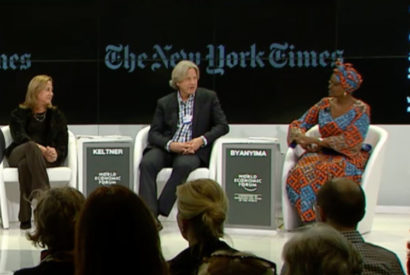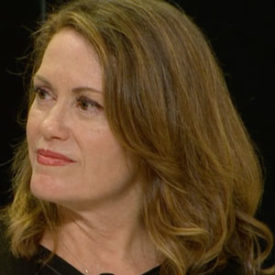At Davos, psychologist explains machismo that gave rise to #MeToo
Expert on gender power dynamics provides male perspective at World Economic Forum
January 26, 2018
The lone male voice on a distinguished panel on gender, power and sexual harassment, UC Berkeley psychologist Dacher Keltner this week offered research insights into male sexual aggression and the backlash that has sparked the #MeToo movement.

UC Berkeley psychologist Dacher Keltner with Ad Council chief executive Lisa Sherman (left) and Oxfam International executive director Winnie Byanyima (right) at World Economic Forum panel on power, gender and sexual harassment.
At the World Economic Forum in Davos, Switzerland, Keltner, author of The Power Paradox, joined panelists Peggy Johnson, an executive vice president at Microsoft; Maryam Monsef, Canada’s minister on the status of women; Winnie Byanyima, executive director of Oxfam International, and Lisa Sherman, chief executive at the Ad Council, whose campaigns include “It’s on Us” (to stop sexual assault), and the soon-to-be-launched That’s Harassment.
Panelists discussed the challenges that have kept generations of women from speaking out, as well as the cultural and economic changes needed to turn the tide on sexism. Click here to watch the panel discussion sponsored by The New York Times.
Johnson of Microsoft recalled the detours she and her female coworkers took 25 years ago to avoid men who made inappropriate comments.
“I have a daughter who just entered the tech industry, and she said, ‘You know mom, when I hear inappropriate jokes, I don’t laugh,'” Johnson said. “I thought to myself, I always laughed because I thought I had to … I don’t anymore because I’m in a position of power. Whenever I feel discouraged I just look at her, and I see it’s changing.”
Reflecting on the #MeToo movement fueled by the behavior of movie mogul Harvey Weinstein and other alleged predators, Keltner described the “sexual overperception” that leads a powerful man to misread social cues and make unwanted advances to a female subordinate.
“If I’m a powerful man and I’m interacting with a woman who is less powerful, I might be feeling more sexually aroused,” he said. “I’ll act on those impulses and encroach on their space. I erroneously believe that the woman is attracted to me when in fact, she’s repulsed, or anxious, and that’s bad news.”
Overall, power changes humans, making them more impulsive and focused on themselves. But men react differently from women, said Keltner, who is co-founder and faculty director of UC Berkeley’s Greater Good Science Center.
“Men tend to take more risks, they tend to be a lot more aggressive and they tend to sexualize things,” he said. By comparison, “women tend to be more collaborative … with women in power, you don’t see as much corruption, you don’t see abuse.”
Keltner, an expert on the science of emotions who serves as a consultant at Facebook and Google, said that on a positive note, the model of power is changing dramatically.
“We are shifting historically from a top-down Machiavellian style toward a more collaborative model,” he said.
Click here to watch a video of the “Gender, Power and Stemming Sexual Harassment” panel discussion
SEE ALSO:
USA Today: How men can teach men not to be sexual harassers
The New York Times: ‘She’s Not Laughing’: In Davos, Taking on Sexual Harassment
